|
|
|
Sort Order |
|
|
|
Items / Page
|
|
|
|
|
|
|
| Srl | Item |
| 1 |
ID:
162453


|
|
|
|
|
| Summary/Abstract |
Can developmental aid bring peace to war-torn communities? The current literature is divided on this issue. One line of reasoning suggests that aid is likely to decrease violence by improving employment and prosperity, thereby making participation in conflict more costly. Another view cites evidence showing an association between aid projects and increased insurgent activity. Addressing this contradiction, we argue that different types of aid projects lead to different outcomes, as some projects foster an unequal distribution of benefits within communities. Our reasoning draws on qualitative accounts from conflict zones, recent research on how grievances associated with exclusion can foster civil war onset, and experimental findings regarding perceived inequity and punishment. Building on this scholarship, we use a recently developed event-matching methodology to offer insight from contemporary Afghanistan. Aid projects that tend to exclude portions of the community yield more insurgent activity in their wake than more inclusive projects. These results shed light on why some aid projects reduce violence while others do not, emphasizing that efforts to ‘win hearts and minds’ can be a source of both contentment and contestation.
|
|
|
|
|
|
|
|
|
|
|
|
|
|
|
|
| 2 |
ID:
162455
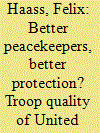

|
|
|
|
|
| Summary/Abstract |
Why do similarly sized peacekeeping missions vary in their effectiveness to protect civilians in conflicts? We argue that peace operations with a large share of troops from countries with high-quality militaries are better able to deter violence from state and non-state actors and create buffer zones within conflict areas, can better reach remote locations, and have superior capabilities – including diplomatic pressure by troop contributing countries – to monitor the implementation of peace agreements. These operational advantages enable them to better protect civilians. Combining data from military expenditures of troop contributing countries together with monthly data on the composition of peace operations, we create a proxy indicator for the average troop quality of UN PKOs. Statistical evidence from an extended sample of conflicts in Africa and Asia between 1991 and 2010 supports our argument.
|
|
|
|
|
|
|
|
|
|
|
|
|
|
|
|
| 3 |
ID:
162458
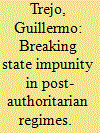

|
|
|
|
|
| Summary/Abstract |
This article claims that cross-national variation in criminal violence in new democracies is highly dependent on whether elites adopt transitional justice processes to address a repressive past. State specialists in violence who repress political dissidents under authoritarian rule often play a crucial role in the operation of criminal markets and in the production of criminal violence in democracy. Some of them defect from the state to become the armed branch of criminal organizations in their deadly fights against the state and rival groups; others remain but protect criminal organizations from positions of state power; and still others use state power to fight criminals through iron-fist policies. When post-authoritarian elites adopt transitional justice processes to expose, prosecute, and punish state specialists in violence for gross human rights violations committed during the authoritarian era, they redefine the rules of state coercion and deter members of the armed forces and the police from becoming leading actors in the production of criminal violence. Using a dataset of 76 countries that transitioned from authoritarian rule to democracy between 1974 and 2005, we show that the adoption of strong truth commissions is strongly associated with lower murder rates; we also find that the implementation of trials that result in guilty verdicts is associated with lower homicide rates only when the trials are jointly implemented with a strong truth commission. In contrast, amnesty laws appear to stimulate criminal violence. Our findings are particularly robust for Latin America and remain unchanged even after addressing selection effects via matching techniques.
|
|
|
|
|
|
|
|
|
|
|
|
|
|
|
|
| 4 |
ID:
162457
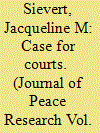

|
|
|
|
|
| Summary/Abstract |
Authoritarian regimes are not known for adopting independent courts, yet the frequency of states empowering their judiciaries has steadily increased. In 1961 only 9% of autocracies had a partially or fully independent court, but by 1987 more than one-third of authoritarian states had reformed their judiciaries. Initiating judicial reform is risky for a regime that seeks to maintain its authority over its populace, including risks to their preferred policy positions and judgments that run contrary to the preferences of the regime. Given these risks, why do authoritarian leaders often relinquish authority to independent courts? This article argues regime leaders will choose to empower at least nominally independent courts in order to resolve information problems that lead to bargaining failures and civil war. This project uses propensity score matching to account for the complex relationship between institutional arrangement and civil war, and finds that states that adopt an independent court reduce their risk of civil war between 54% and 75% when compared to states that are equally likely to have adopted an independent court, but did not. These results suggest that leaders seeking to reduce uncertainty when bargaining with potential oppositions groups have strong incentives to implement independent judiciaries, and improve our understanding of how and why authoritarian leaders choose to delegate authority to independent judicial institutions.
|
|
|
|
|
|
|
|
|
|
|
|
|
|
|
|
| 5 |
ID:
162456
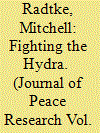

|
|
|
|
|
| Summary/Abstract |
In the past 25 years, the United Nations has sanctioned 28 rebel groups in 13 civil wars. Have the UN sanctions been effective in meeting the goal of conflict reduction? In this article, we argue that UN sanctions are effective to the extent that they can constrain and weaken some rebel groups. But this constraining effect can only occur when UN sanctions curtail rebel groups’ ability to adapt. For less adaptable groups, UN sanctions can trigger a causal chain of depressed rebel income, territorial losses, and battlefield defeats that leads to conflict reduction. This adaptability is the key to the understanding of UN sanctions’ effectiveness in conflict reduction, as rebel groups often engage in illegal and criminal economic activities and many of them are ‘Hydra-like’, being able to shift their income sources in response to sanction measures. As evidence of how UN sanctions can trigger these conflict dynamics, we first perform negative binomial regression on all civil war cases. We then proceed to provide more detailed evidence for our causal chain by conducting time-series intervention analysis on two sanctioned rebel groups: UNITA in Angola and al-Shabaab in Somalia. Our work is the first systematic quantitative analysis of UN sanctions’ effects on rebel groups, and the results have implications for the viability of economic coercion as a means to intervene into civil conflicts.
|
|
|
|
|
|
|
|
|
|
|
|
|
|
|
|
| 6 |
ID:
162459
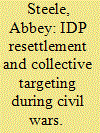

|
|
|
|
|
| Summary/Abstract |
Refugees and internally displaced people (IDPs) are not always safe where they resettle in ethnic civil wars, in which civilians’ identities overlap with the ethnic profile of armed combatants. This article argues that IDPs are also vulnerable in non-ethnic civil wars, through two related mechanisms that indicate civilians’ loyalties: (1) where the displaced are from and when they left; and (2) resettlement patterns. The first can suggest loyalties when the displacement is associated with territorial conquest and expulsion of suspected sympathizers. In turn, the displaced would be considered disloyal by the armed group responsible for the expulsion, and could be subject to further violence where they resettle. The second mechanism relates to the first: if displaced civilians are considered disloyal, then resettling with other, similarly stigmatized civilians can improve their security by reducing the household’s risk of discovery. However, clustering together with other IDPs can have a perverse effect: even though living in an enclave may reduce a particular household’s likelihood of suffering violence, the group itself is endangered because it is more easily detected. Armed groups can collectively target IDPs who resettle in clusters, either for strategic or retributive reasons. Implications of the argument are tested with detailed subnational panel data on IDP arrivals and massacres in Colombia, and the analyses provide support for the argument. The findings indicate that collective targeting of IDPs occurs even in civil wars without an ethnic cleavage, following voluntary resettlement patterns, and reinforces IDP security as a policy priority.
|
|
|
|
|
|
|
|
|
|
|
|
|
|
|
|
| 7 |
ID:
162454
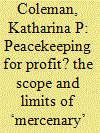

|
|
|
|
|
| Summary/Abstract |
Developing states furnish the vast majority of UN peacekeeping troops, a fact academics and policymakers often attribute (at least partly) to developing states’ supposed ability to derive a profit from UN peacekeeping reimbursements. In this article, we argue that this ‘peacekeeping for profit’ narrative has been vastly overstated. The conditions for significantly profiting from UN peacekeeping are in fact highly restrictive, even for developing states. We begin by highlighting two potent reasons for re-examining the peacekeeping for profit narrative: developing states emerged as the UN’s principal troop contributors in a period of stagnant reimbursement rates when UN peacekeeping was becoming less financially attractive; and the quantitative evidence scholars have presented as supporting the peacekeeping for profit narrative is flawed. We then identify the scope conditions within which peacekeeping for profit provides a plausible explanation for a developing state’s UN troop contributions. First, the deployment and its attendant reimbursements must be significant not only in absolute and per-soldier terms but also in relation to the state’s total armed forces and military expenditure. Second, the state must have an exceptional ability, compared with other troop contributors, to benefit from UN reimbursements. The scope for generalized profit-making from either equipment or personnel contributions is limited by intense political pressure against reimbursement rate increases. Individual states can nevertheless make a profit if they (1) invest in inexpensive and old but functional equipment, especially if deployed with usage restrictions, and/or (2) limit the deployment allowances (rather than salaries) they pay their peacekeepers. We establish that only a limited subset of developing states meets the plausibility conditions for the peacekeeping for profit narrative – and many top UN troop contributors do not.
|
|
|
|
|
|
|
|
|
|
|
|
|
|
|
|
|
|
|
|
|